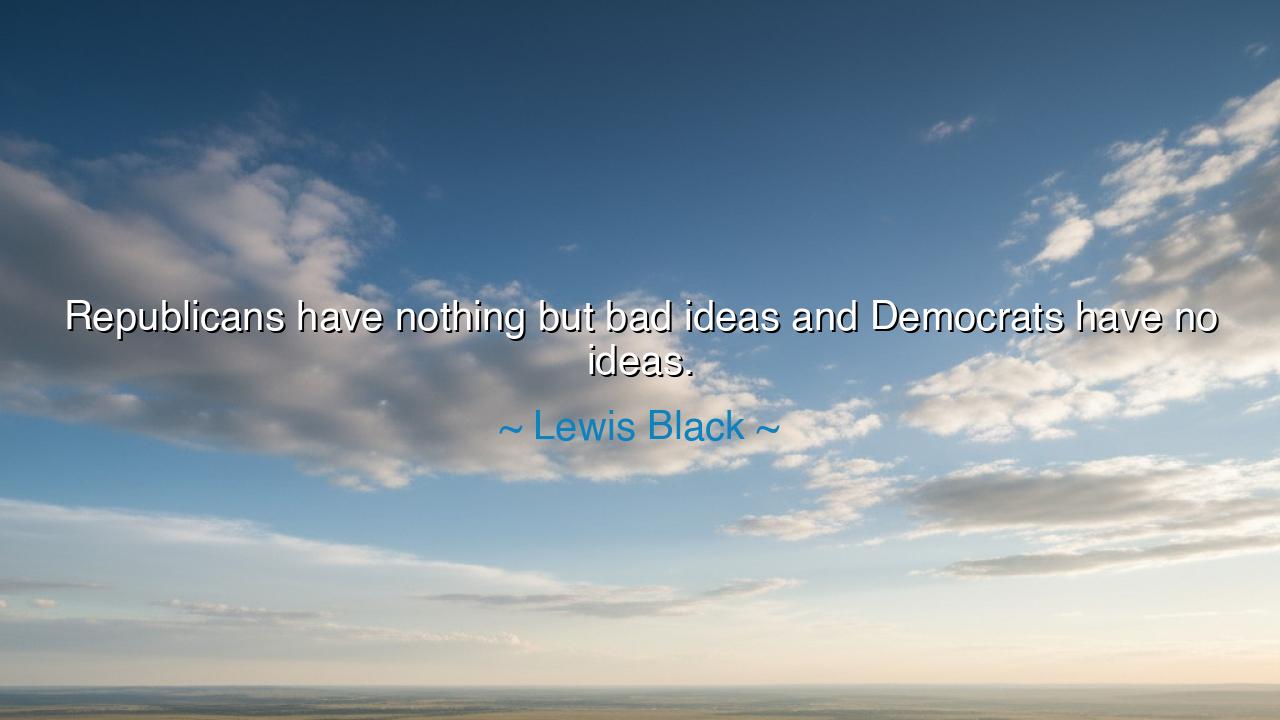
Republicans have nothing but bad ideas and Democrats have no






Lewis Black, the jester-philosopher of our age, once thundered in his satire: “Republicans have nothing but bad ideas and Democrats have no ideas.” What sounds like mockery is in truth a lament for the state of governance, a cry of despair at a system where one party surges forward with perilous schemes while the other stands paralyzed by hesitation. In his fury lies wisdom, for Black reminds us that ideas are the lifeblood of democracy—without them, the republic stagnates; with corrupt ones, it collapses.
The Republicans, in his jest, are painted as reckless builders, hammering structures without regard for foundation or consequence. Their bad ideas, though full of motion, often ignore justice, compassion, or balance. The Democrats, by contrast, are portrayed as dreamers afraid to dream, keepers of silence when speech is required. They wield the shield of caution so heavily that they forget to raise the sword of vision. Black’s paradox is thus revealed: one side errs by action, the other by inaction, and the people are left wanting true leadership.
History itself bears witness. In the years before the Great Depression, conservative leaders clung to the dogma of markets unrestrained, blind to the suffering of the people. Their “bad ideas” deepened collapse. Yet even as crisis unfolded, the opposition hesitated, offering little until Franklin D. Roosevelt seized courage in the New Deal. His bold action proved that when vision returns, even despair can be turned to hope. Black’s satire would have found fertile ground in that era: too many bad ideas on one side, too little courage on the other.
The same truth appears in the age of slavery. For decades, defenders of bondage advanced cruel laws and justifications—truly bad ideas in their essence. Yet many opponents in the North, though disapproving, shrank from decisive action, fearing division. It was only when voices like Abraham Lincoln and Frederick Douglass rose with clarity that the balance shifted. Here again lies Black’s wisdom: progress requires more than mockery of evil—it requires ideas strong enough to confront it.
Therefore, O children of the republic, take heed of this comic truth spoken in bitterness. Do not be lulled into thinking that satire is mere jest. It is often prophecy. The lesson is clear: a nation cannot survive on bad ideas, nor can it thrive on no ideas. What is needed are wise ideas—born of courage, tempered by justice, and carried forward with resolve. For the destiny of a people rests not in parties, but in the vision that dares to shape tomorrow.






QTQuan Tran
This quote hits hard, but I wonder if it’s an overgeneralization of the political situation. Could it be that both parties actually have ideas, but they are drowned out by partisanship and the inability to compromise? Is the issue that both Republicans and Democrats are stuck in their own echo chambers, failing to come up with innovative solutions to the country’s problems? Wouldn’t a more collaborative approach be more effective in these times?
DBPham Danh Bach
Lewis Black’s quote feels like a punch to the gut for both parties, and I can’t help but wonder if this criticism is too extreme. While both sides may struggle with presenting solid, actionable ideas, aren’t there elements of good policy on both sides? The bigger question might be whether the political system itself is broken, leading to poor decision-making across the board. Is it possible for politicians to start prioritizing the greater good over party loyalty?
UGUser Google
This quote speaks to the disillusionment many people feel with the political system. It’s easy to get frustrated with both parties when it feels like they’re more focused on scoring political points than coming up with meaningful solutions. But are we being too harsh on both sides? Is the real problem the inability to prioritize the needs of the people above party politics?
PHPham Ha
I think Lewis Black’s comment is a sharp criticism of how politics has evolved in the U.S. But is it fair to say that both parties are equally to blame for the current state of affairs? Aren’t there varying degrees of ideas in both parties that might be worth exploring? Could it be that the real issue is not the absence of ideas, but rather how these ideas are presented and implemented?
GDGold D.dragon
This quote definitely captures a sense of frustration with the current political landscape. Could it be that both parties are so focused on fighting each other that they forget to focus on solving real issues? Or maybe it’s just that the public feels both Republicans and Democrats are too out of touch with the needs of ordinary people. What would a system look like where both parties actually collaborate for real solutions?